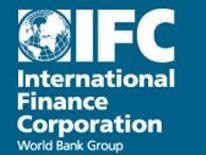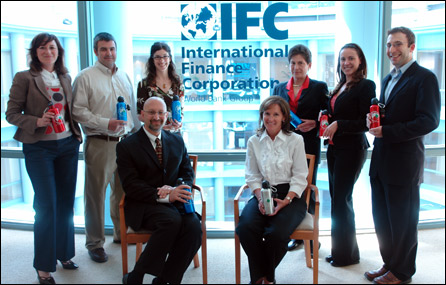
International Financy Corporation
2010 Mayor's Environmental Excellence Award Winner:
Outstanding Achievement by a Large Facility
IFC, a member of the World Bank Group, has made a public commitment—“IFC’s Footprint Commitment”—to make sustainability an integral part of its day-to-day work in IFC offices around the world, and to continually improve the environmental performance of IFC’s internal operations. IFC headquarters office in Washington, D.C., encompassing 1,138,000 gross square feet and over 2,560 workstations to accommodate staff, consultants, and contractors.
The IFC Facilities Management Unit has been leading the way in making important technological and process adjustments in the way the D.C. office functions, saving an estimated 1.6 million kilowatt hours of electricity, 4.1 million gallons of water, and diverting 257 tons of waste/recyclables from the landfill in 2009 alone. In FY09, Facilities Management committed to a 10% electricity-reduction target for the D.C. office over the next five years (in addition to the 17.4% reduction achieved since FY02).
Since December 2004, IFC has bought renewable energy certificates (RECs) to cover 100% of the electricity use in its D.C. office. In addition, the Unit is leading the effort for LEED certification for the D.C. building (The building received the Energy Star Label for 1999, 2001, and for 2004 through 2008). Examples of other best-practice facilities-based changes are outlined below:
| Water | Savings |
| Water-closet flush valve conversion | 3,000,000 gallons |
| Lavatory faucets flow reduction | 737,375 gallons |
| Shower-head flow reduction | 151,875 gallons |
| Urinal flow reduction | 131,250 gallons |
| Pantry-faucet flow reduction | 86,250 gallons |
| Energy | Savings |
|
Operational hours for central HVAC and lighting systems shortened |
510,000 kWh |
|
Variable Frequency Drives (VFDs) installed on large cooling-tower motors |
303,030 kWh |
|
50% of fluorescent bulbs removed on 10 floors in open office areas |
453,000 kWh |
|
Replaced incandescent lights with compact florescent light bulbs (CFLs) |
293,000 kWh |
| Turned off drive lane lighting on parking levels B2, B3, B4 |
72,000 kWh |
| Waste & Recycling in FY 20009 | Amounts Collected |
| IFC small-item “Recycling Center” | 160 pounds technotrash, 371 pounds batteries diverted from landfill |
| Cardboard recycling | 24 tons of cardboard diverted from landfill |
| Paper, glass, plastic and aluminum recycling efforts | 176 tons of paper 3.6 tons of glass, plastic, and aluminum diverted from landfill |
| Sold 600 desk chairs for re-use, and recycled 65,850 pounds of office furniture | Estimated 42 tons furniture diverted from landfillPantry-faucet flow reduction |
| Recycled 1,031 PCs | Estimated 5 tons of electronic equipment diverted from landfill |
| Recycled 95,700 pounds of carpet | 48 tons of carpet material diverted from landfill |
Carbon Footprint
Emissions from IFC’s D.C. operations represent about half of IFC’s overall corporate impact. IFC has been carbon-neutral for all its D.C. operations since 2006.1 This has been achieved through:
- Calculating greenhouse-gas emissions from internal business operations, which includes staff air travel, electricity used by the D.C. office, fuel use for vehicles and machinery, and natural gas and refrigerants used.
- Reducing carbon emissions through familiar and innovative energy-saving measures
- Purchasing carbon “offsets” for emissions that cannot be reduced
Food Service
The World Bank Group’s food service provider, Restaurant Associates, was chosen partly because of their environmentally preferable products and services. This includes “greener” disposables like potato-based utensils, post-consumer paper containers, and post-consumer fiber cups; fair trade, organic coffee; transfat-free oils; rBGH-free dairy items; seafood purchases based on the Monterey Bay Aquarium Sustainable Seafood Watchlist; cagefree eggs; and organic items, where available. Surplus food is donated to D.C. Central Kitchen.
"10-Minute Tune Up"
In 2009, the Footprint Program launched the “10-Minute Tune Up,” with the goal of sharing simple ways IFC staff could use resources more efficiently while at work—in a quick 10 minutes. The Tune Up is implemented in each department (“desk-by-desk”) by a team of Footprint Champions, who go through a checklist of succinct, simple suggestions and help staff make easy one-time changes (such activating energy-saving features on their computers). Each “Tuned Up” staff person receives an emblem for their desk and is entered into a raffle for prizes. In this program’s first year, over 800 staff (almost 30%) were “Tuned Up,” including many senior-level staff.
IFC is the first of all UN agencies to be carbon-neutral for all global business operations.

Top row (from left to right):
- Maria Fyodorova, Sustainability/CSR Communications Consultant, IFC Footprint Program
- Chris Potkay, Chief Engineer, Brandywine Realty Trust, IFC Facilities Management Unit
- Sarah Raposa, Program Officer, IFC Footprint Program
- Nina Shapiro, Vice President, Finance and Treasurer of IFC and Chair of the IFC Footprint Program Advisory Committee
- Vanessa Ferragut, CMP, Events & Outreach Consultant, IFC Footprint Program
- Adam Rubinfield, Sustainability Coordinator, WB Corporate Responsibility Program
Bottom row (from left to right):
- Robert Pearlman, Sr. Facilities and Administration Officer, IFC Facilities Management Unit
- Christine Jones, Property Manager, Brandywine Realty Trust, IFC Facilities Management Unit
Not present:
- Bilal Rahill, Manager, Environment and Social Development Department, IFC
- Elizabeth B. Casqueiro, Manager, IFC Facilities Management Unit
- Judith Moore, Team Leader, WB Corporate Responsibility Program
- Monika Kumar, Sustainability Coordinator, WB Corporate Responsibility Program
- Viki Betancourt, Manager, WBG Community Outreach
1 IFC's carbon footprint accounts for greenhouse gases (GHG) from internal business operations. The total emissions—including carbon dioxide, methane, and nitrous oxide—are translated into metric tons of carbon dioxide equivalent (tCO2e), so that the total impact can be summed in one figure.

